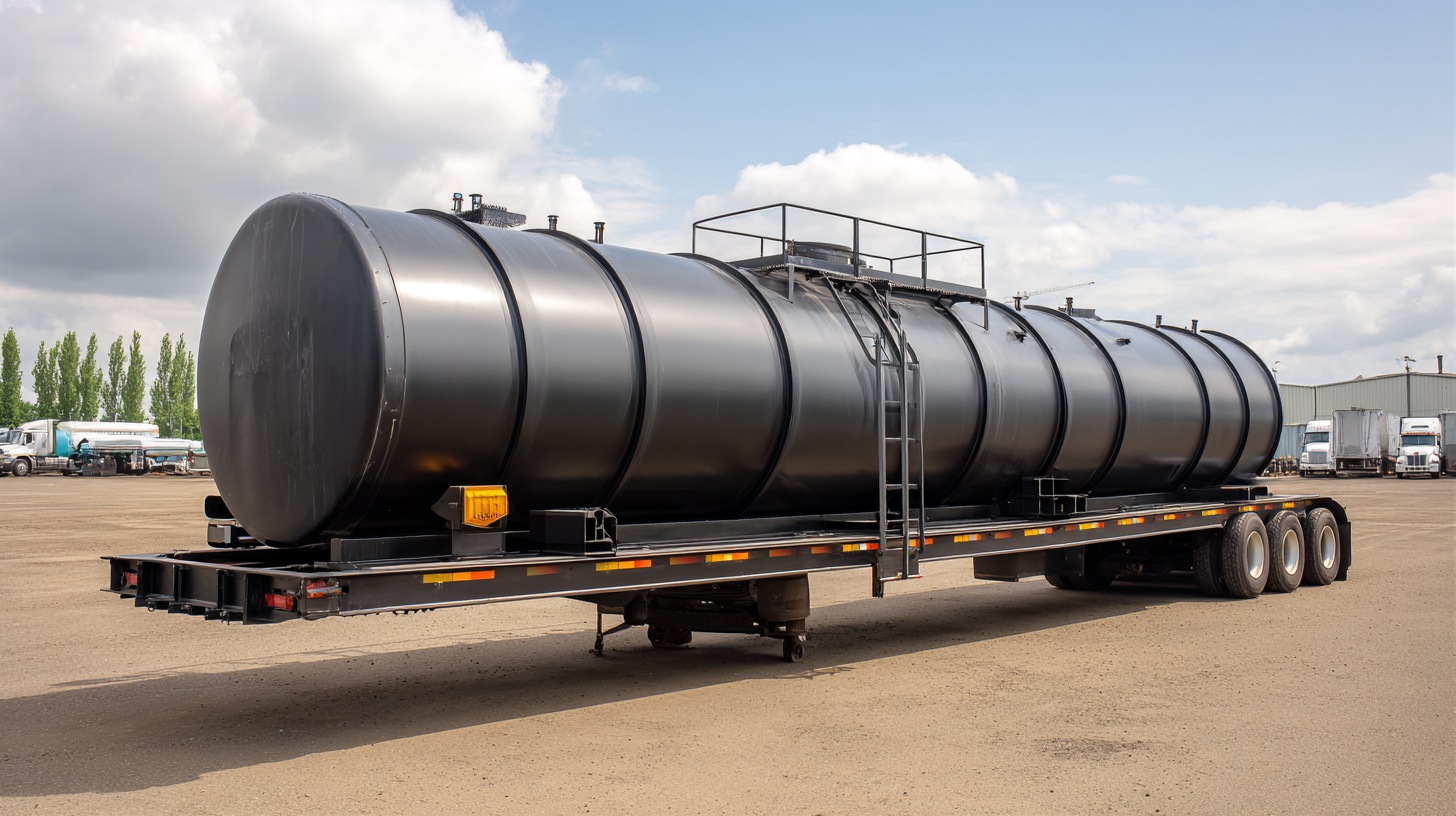Why Understanding Diesel Tanks is Essential for Your Business Operations
Understanding the intricacies of diesel tanks is crucial for any business that relies on diesel-powered machinery or vehicles. With the increasing demands for efficiency and sustainability in operations, the importance of managing diesel tanks effectively cannot be overstated. A well-maintained diesel tank system ensures not only the uninterrupted flow of operations but also compliance with safety regulations and environmental standards. Moreover, businesses can significantly reduce costs through optimal fuel management practices, preventing wastage and minimizing downtime. This article will delve into the essential aspects of diesel tanks, highlighting best practices that can help streamline operations, improve safety protocols, and foster a more sustainable business model. By prioritizing the understanding of diesel tanks, companies can enhance their operational resilience and drive growth in an increasingly competitive market.

The Importance of Diesel Tank Management in Business Efficiency
 Effective diesel tank management plays a critical role in optimizing business efficiency,
particularly for companies that rely on diesel fuel for their operations.
Maintaining a well-organized diesel tank system ensures that fuel is readily available when needed,
reducing downtime and allowing operations to run smoothly. Proper monitoring of tank levels and usage can help prevent unexpected shortages,
which can disrupt projects and delay service delivery, ultimately affecting the bottom line.
Effective diesel tank management plays a critical role in optimizing business efficiency,
particularly for companies that rely on diesel fuel for their operations.
Maintaining a well-organized diesel tank system ensures that fuel is readily available when needed,
reducing downtime and allowing operations to run smoothly. Proper monitoring of tank levels and usage can help prevent unexpected shortages,
which can disrupt projects and delay service delivery, ultimately affecting the bottom line.
Additionally, managing diesel tanks involves adhering to safety regulations and environmental standards, which is crucial for minimizing operational risks.
Regular inspections and maintenance of tanks not only prolong their lifespan but also prevent costly leaks and spills that can lead to significant fines and cleanup efforts.
Furthermore, an efficient diesel management system can provide valuable data that assists in making informed decisions about fuel consumption
and expenditure, contributing to more sustainable and cost-effective business practices.
In essence, investing in diesel tank management is a strategic move that enhances overall business operations.
Key Regulations and Compliance Requirements for Diesel Storage
Understanding diesel tanks is crucial for businesses that rely on diesel fuel for operations, especially in light of evolving regulations surrounding diesel storage and environmental compliance. Companies must adhere to stringent guidelines to ensure their diesel tanks are properly maintained and regulated. This not only helps in avoiding hefty fines but also promotes safety and efficiency in fuel management. According to industry projections, the diesel generator market in India is expected to reach USD 2.59 billion by 2032, highlighting the importance of robust diesel storage solutions to support this growth.
Tips: Regularly inspect your diesel tanks for leaks and corrosion. Ensure that your storage facilities meet local regulations to avoid potential penalties. Investing in a quality monitoring system can enhance compliance and operational efficiency.
Compliance with regulations such as those set forth by environmental agencies is essential to prevent pollution and ensure safety. For instance, facilities must have spill containment measures in place and conduct regular maintenance checks. With the diesel generator market anticipated to grow at a compound annual growth rate of 7.39%, the demand for compliant and efficient diesel storage solutions becomes even more pressing.
Tips: Engage with expert consultants to stay updated on compliance requirements. Implement a routine maintenance schedule to keep your diesel tanks in optimal condition and aligned with current regulations.
Best Practices for Maintaining Diesel Tanks and Fuel Quality
Maintaining diesel tanks and ensuring fuel quality are critical for the smooth operation of businesses that rely on diesel engines. As prices for diesel fuel continue to rise, it becomes increasingly important to monitor fuel filters closely. Regular maintenance of these filters can prevent engine performance issues and ensure efficient operation, ultimately protecting your investment in machinery and reducing operational costs. Using super-clean fuel is essential, especially with high-pressure fuel systems that are prevalent in modern diesel engines. Neglecting this can lead to serious machinery breakdowns and costly repairs.
Additionally, businesses must be vigilant about potential corrosion in storage tanks and the risks associated with fluctuating fuel flashpoints. Issues such as variability in fuel quality, including contaminants and the effects of additives, can significantly impact engine performance. It is crucial to implement best practices in diesel fuel filtration and regular tank maintenance to mitigate these risks. Ensuring tanks are clean and properly maintained not only enhances fuel quality but also safeguards the environment by reducing emissions from diesel engines.
Cost Implications of Improper Diesel Tank Management
Improper management of diesel tanks can have substantial cost implications for businesses engaged in operations relying on diesel fuel. One of the most immediate risks associated with neglecting diesel tank maintenance is the potential for fuel contamination. Contaminated fuel can cause engine malfunctions and reduced efficiency, leading to unplanned downtimes and costly repairs. Additionally, if a diesel tank is not properly maintained, it can lead to leaks, which not only necessitate expensive cleanup processes but can also result in fines and regulatory penalties, further straining a company’s finances.

Another critical aspect is inventory mismanagement, which can occur when businesses fail to monitor diesel consumption accurately. This can lead to over-purchasing of fuel, tying up capital that could be allocated elsewhere in the business. Moreover, fuel price fluctuations can dramatically alter the cost of operations if a company is unable to predict its fuel needs accurately. By understanding the importance of effective diesel tank management, businesses can mitigate these risks, enhance efficiency, and ultimately protect their bottom line.
Assessing the Risks Associated with Diesel Fuel Storage Systems
Understanding the risks associated with diesel fuel storage systems is critical for any business that relies on diesel for its operations. According to the U.S. Environmental Protection Agency (EPA), storage tank leaks are a significant environmental concern, with around 10% of underground storage tanks in the United States estimated to leak. This risk not only poses environmental hazards but can also lead to costly fines and remediation efforts for businesses caught in compliance issues.
Furthermore, the National Fire Protection Association (NFPA) highlights that improper handling and storage of diesel can result in fire hazards. In its fire prevention code, the NFPA notes that diesel fuel can ignite under specific conditions, leading to potential accidents that could endanger employees and facility security. It's crucial for businesses to conduct regular risk assessments and ensure adherence to the regulations imposed on diesel storage to mitigate these risks effectively. Implementing comprehensive training programs and establishing stringent safety protocols can significantly reduce the likelihood of accidents and enhance overall operational efficiency.
Understanding Diesel Tanks: Risks Associated with Diesel Fuel Storage
Related Posts
-

7 Reasons to Choose a Diesel Transfer Tank with Pump for Your Business
-

Ultimate Guide to Sourcing High Quality Diesel Tanks for Your Business Needs
-

5 Best Diesel Fuel Tank Solutions for Your Business Efficiency
-

Ultimate Guide to Selecting the Right Fuel Transfer Tank with Pump: Expert Insights and Industry Standards
-

Unlocking Efficiency: The Advantages of Advanced Fuel Storage Tanks for Your Business
-

How to Select the Right Centrifugal Pump for Your Industrial Applications